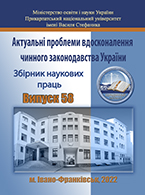Criminal-legal protection of judicial bodies from interference: comparative aspect
DOI:
https://doi.org/10.15330/apiclu.58.68-79Keywords:
riminal law protection, justice, judiciary, interference, influence, obstruction.Abstract
The article emphasizes the importance of protection of criminal justice relations, the independence and impartiality of which are the key to the development of society and the state, in line with relevant policies. Attention is drawn to one of the toughest methods of combating unlawful interference in the administration of justice, which is rightly advocated by the implementation of the mechanism of criminal responsibility, but law enforcement practice in this regard shows the lack of efficiency of criminal justice. The article also analyzes the current state of law enforcement, the practice of which is influenced by a number of factors: the complexity of evidence, latency of criminal acts, reluctance of the judiciary to request an official response, and so on. There are questions about the quality of the norm of Article 376 of the Criminal Code of Ukraine, its ability to provide a full response to criminogenic challenges in modern conditions.
An analysis of the criminal law of the Romano-Germanic legal system is presented in terms of consolidating responsibility for interference in the activities of the judiciary, which can be classified into two general groups: 1) codified acts in which the analyzed illegal behavior project of criminal law protection, and detailed due to instructions on influence, intervention, obstruction by various means (France, Spain, Poland, Bulgaria); 2) codified acts that do not provide for the protection of the administration of justice in general, and illegal influence / interference in the activities of the judiciary are assessed as torts against the government or the order of performance of duties (Germany, the Netherlands). It has been established that the legislation of the post-socialist states is characterized by the regulation of criminal liability for encroachment on justice, which is either an independent object or a structural unit of another, more general entity - state power (Armenia, Azerbaijan, etc.). The analyzed international experience is suggested to be possible to borrow in terms of expanding the list of victims of illegal behavior, its detailing and differentiation of responsibility with the help of qualified elements of the crime.


